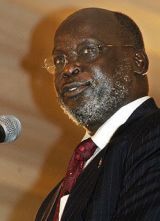Sudan’s new VP replaces all govt officials in South
By MOHAMED OSMAN
KHARTOUM, Sudan, July 19, 2005 (AP) — In his first decrees as Sudan’s No. 2 leader, former rebel chief John Garang dissolved his guerrilla movement and dismissed all government officials in 10 southern states.
 The moves implement measures called for under an interim constitution and peace agreement that ended a 21-year-year civil war between the Muslim north and mainly Christian and animist south.
The moves implement measures called for under an interim constitution and peace agreement that ended a 21-year-year civil war between the Muslim north and mainly Christian and animist south.
The settlement made Garang first vice president – second only to President Omar el-Bashir – as well as president of southern Sudan, letting him set up an interim administration there until a referendum in six years on secession.
The decrees were announced by state-run Omdurman radio, which used to castigate the former rebel leader.
Garang led the Sudan People’s Liberation Army in the war against the Khartoum government. The war in Africa’s largest country ended in January with the signing of the comprehensive peace agreement, and he was sworn in as first vice president July 9.
Garang’s decrees replaced the governors in the south who had been appointed by el-Bashir. The edicts also dissolved all the legislative councils in the region.
Garang set up a new administration, naming Salva Kiir Mayardit as vice president of the southern government. Kiir was Garang’s second in the Sudan People’s Liberation Army.
Garang also appointed 10 of his former senior army commanders and former aides as administrative supervisors for the southern states, replacing the governors.
The caretaker administrators will run the south until a referendum on secession, which will come six years from now under the peace agreement.
The accord provided for sharing of power and wealth with southerners but has been criticized for not including other marginalized peoples, including those in the western Darfur region.
The interim constitution allocates 52 percent of government and parliament posts to the current ruling National Congress Party, and 28 percent to Garang’s former rebel movement, and the rest to other parties.
The civil war ravaged the infrastructure in oil-rich southern Sudan, a vast region that saw little or no development during the fighting.
